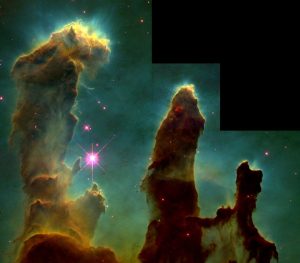
The Pillars of Creation, one of the Hubble Space Telescope’s most iconic images. Image credit: NASA, ESA / STScI / J. Hester & P. Scowen (ASU)
The Hubble Space Telescope is 30 years old – something that even its most enthusiastic supporters couldn’t have dreamt of when it launched in 1990. With the help of a host of astronomers and space scientists, Chris North explores the history of the mission and the revolutionary discoveries that have been made.
Prof Anu Ojha OBE, Director of the National Space Centre, recaps the launch of the mission and subsequent visits to repair and upgrade it.
Cosmologist Prof Steve Eales (Cardiff University) explores how Hubble has reached into the most distant reaches of our Universe. Prof Jane Greaves (Cardiff University), meanwhile, delves into the hearts of star-forming regions where solar systems are in the process of forming.
Closer to home, planetary scientist Prof Leigh Fletcher (University of Leicester) uses Hubble to study the atmospheres of the giant planets in our Solar System, over both long and short timescales.
Lastly, we look to the future, and the James Webb Space Telescope – often billed as the successor to Hubble. Dr Sarah Kendrew, ESA instrument scientist on the MIRI instrument, explains what this future telescope has learned from Hubble, and what we can expect in terms of discoveries.
We finish with a look at one of Hubble’s most iconic images, and what it means for both astronomers and the general public.
An extended edition of an original broadcast on 30th Apr 2020 as part of Pythagoras’ Trousers on Radio Cardiff.





